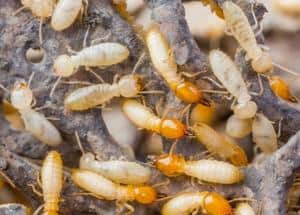Do you have a problem with telling apart carpenter ants vs termites? Don’t worry: you are not the first human being who can’t do it. The truth is they look quite similar to the unprofessional eye. The problem gets even bigger if you can’t catch the pest.
While you know for sure that the wooden frames and décor are suffering from the insect, you may not know who you’re dealing with. Both carpenter ants and termites can cause this problem.
Meanwhile, only by learning the reason for your headaches can you achieve positive results and get rid of the pest.
Details on Carpenter Ants and Termites
The untrained eye may not differ from termites vs carpenter ants at all. They both have a long body, similar wings, and prefer wood to anything else. Once they start ruining your house, you may decide that you can’t waste time looking for the difference.
This is a huge mistake. While they look similar, they are different. They even belong to different families.
While carpenter ants are representatives of the Formicidae family, termites belong to the Termitidae epifamily. You have to find out who you are dealing with in the first place.
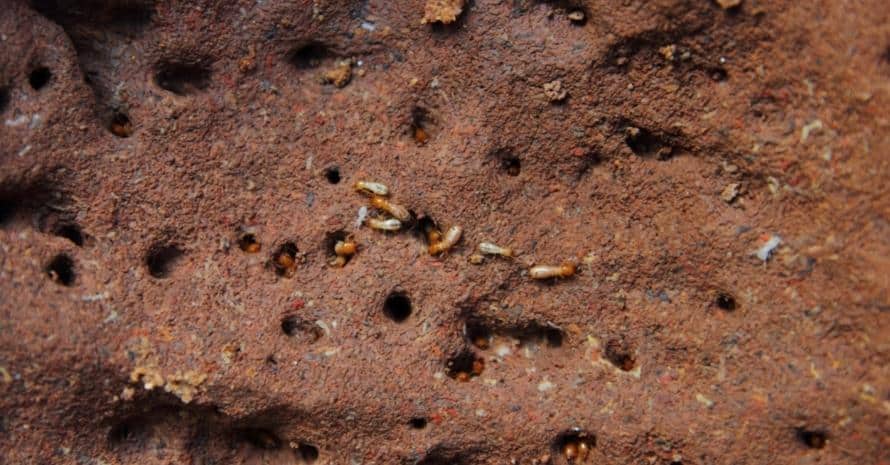
Carpenter ants vs termites differences
You can’t place ants and termites in one group based on their love for wood. It will be a mistake that could lead you to the loss of your favorite furniture.
My recommendation is to follow the insect, catch it, and check out whether it is a carpenter ant or termite before you do anything. I hope my detailed description of signs of carpenter ants vs termites can help you.
Appearance
Let’s talk about the physical differences between the insects. Although I told you that they have slightly similar body shapes, this is not the whole truth. They can easily differ if you look close. If you have bad eyesight, take the magnifying glass. Here is what you have to look for to learn what is the difference between termites and carpenter ants:
- The shape of the body. If you can, look at the abdomen of the creature you’ve just caught. Termite’s body is rectangular, without any signs of “waist,” while carpenter ants have an almost perfect waist;
- Insect’s antennae. Carpenter ant is not straight. It is bent and sometimes elbowed, unlike the long and beaded antennae of termites. It is hard not to notice the difference;
- Wings are considered to be the best indicator. Once the insect gets wings, you will definitely know the difference. Termite has four long wings of similar size and longer than the body. Carpenter ants have short back wings and longer front wings. The wings of the carpenter ant are not too long. Yet, termites’ wings sometimes fall off. If you find numerous fallen wings, you can understand that it was left by the termites’ colony;
- Color. Another difference you can recognize: the color of each insect is different. While carpenter ant workers have a dark or reddish color, termites can be either light-colored or transparent. This is why it is hard to notice termites.
Behavior
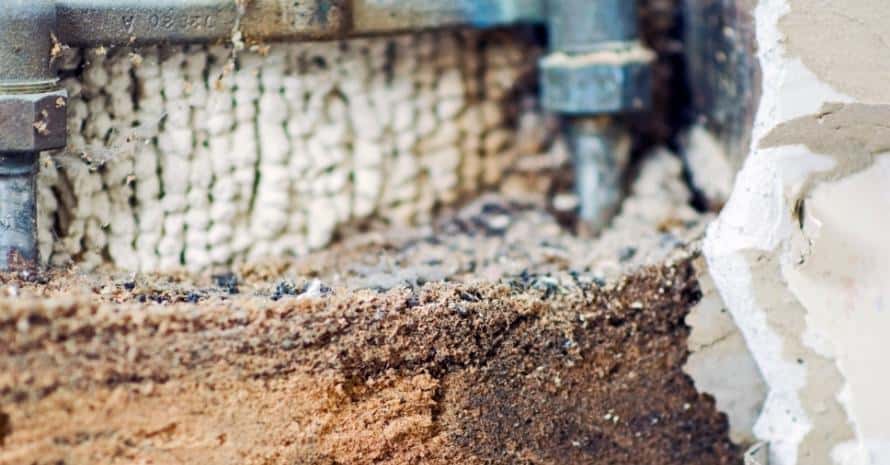
There is a behavioral difference between wood ants vs termites which can’t be unnoticed if you are observant. To notice that, you have to follow the insect. Don’t kill it if you want to find the answer. Here are the most popular differences in behavior:
- Carpenter ants, unlike termites, don’t dig deep inside the wood. They excavate the wood for the nests close to the surface. Since they don’t eat the wood, you will see the piles of shavings near the holes;
- Different shapes. Tunnels that termites build are chaotic, never neat, and usually unfinished. Termites have their tunnels filled with mud and soil. On the contrary, carpenter ants prefer to make finished and well-developed tunnels;
- Mud tubes. If you see the mud tubes around, this is the work of termites. They serve as the passageways for these insects. Carpenter ants don’t do that.
Food
That’s the popular question. I can say that carpenter ant damage vs termite damage is different mainly because carpenter ants don’t eat the wood. They are attracted to different insects.
Meanwhile, termites like cellulose that wood consists of. Termites would choose slightly rotten wood over the fresh one. Carpenter ants consider the wood only as a possible home for the colony.
Nests
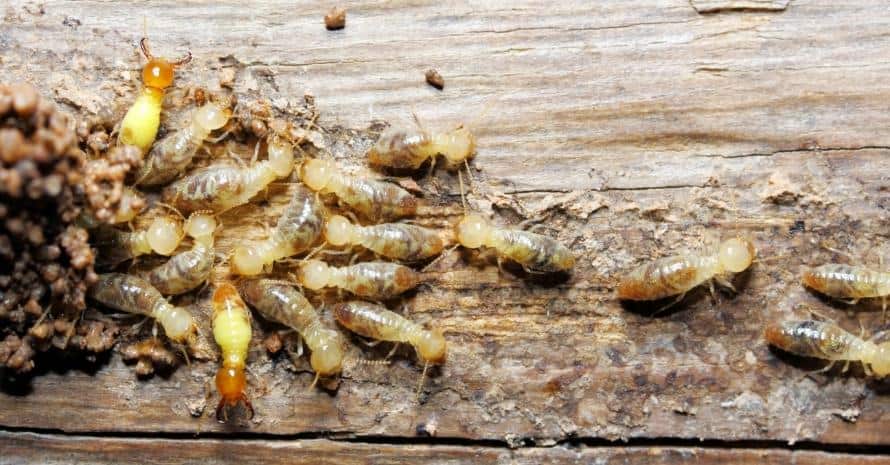
Both species can live inside the wood. While carpenter ants peacefully live inside the wood for years, termites can eat their houses and look for new ones. They all can settle down in window frames, chimneys, doors, and under the roofs.
Damage
I consider termites more dangerous mainly because they are hard to catch. They can eat wood, flooring, and even wallpaper. Their main goal is to receive all the food without being noticed.
Carpenter ants provide less damage since they don’t eat the wooden nest they created. Yet, they both are hard to catch, and they both are dangerous for your house.
How to prevent termite infestation
You may start your fight against termites with preventive measures so you would not have to struggle with the termite army later. Many professionals would recommend you remove all the wood you can from your house.
I don’t think that some wooden bars or flooring can be removable. Ok, jokes aside – I do recommend covering the wood with specific covering against termites or ants. Check the wood for the signs of rotting or damage constantly.
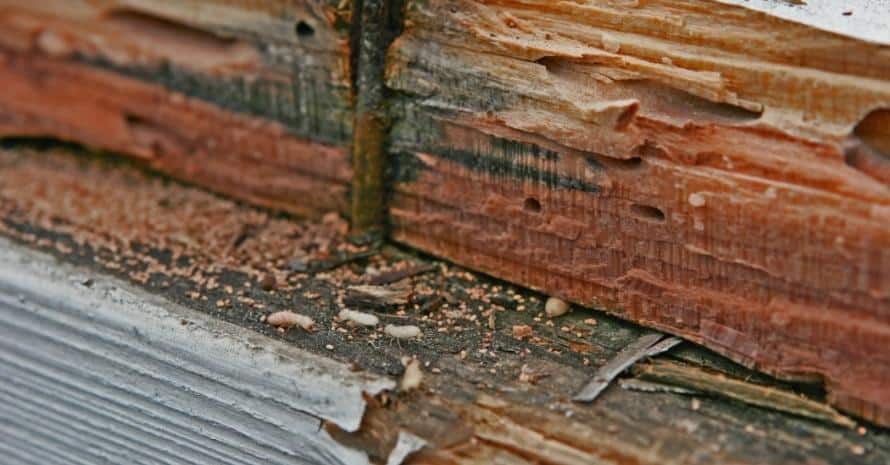
Apart from that, you have to keep the shrubs that grow outside far from your windows if you have wooden frames. If you can’t, at least make a 1 ft gap between them. Cut the grass outside your house, so termites would not crawl by it to the wooden walls.
How to prevent carpenter ants infestation
Carpenter ants are nasty neighbors to share your house with. If you don’t want their presence at all, you have to act in advance. Remove the major attractions for carpenter ants.
Make sure there is no damage or rotten wood in your house. Carpenter ants, similarly to any other type of ants, are attracted to the water and sweets. You have to clean your house and hide all the food from the table.
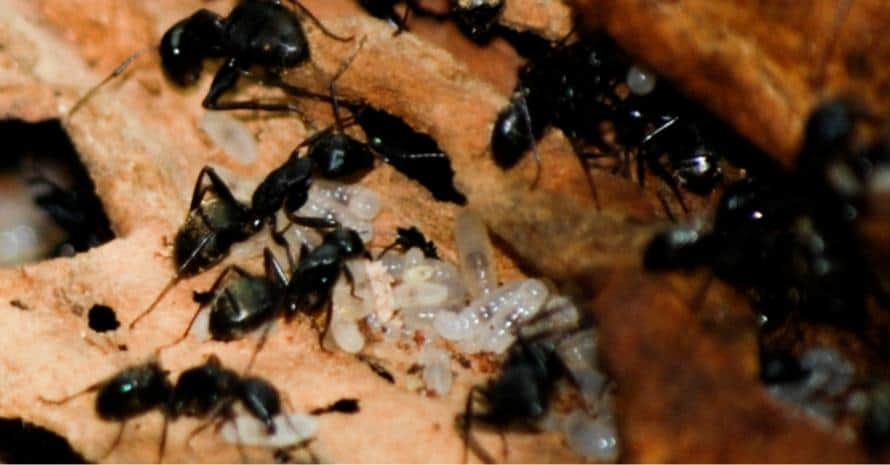
I recommend keeping all the decaying wood somewhere far from your house if you need it, of course. You can also close all the holes and cracks in the walls. Seal the leaks in pipes.
The moisture usually attracts ants to your house, so wipe all the water on the floor and make sure there are no problems with plumbing.
FAQ
Since there are too many questions from users online, I decided to pick only the most popular. Hopefully, my answers will help you to live your life without any termites or ants. If you have more recommendations to add, you can easily do it in the comments.
Which infestation is worse, carpenter ants or termites?
I believe both types of insects can be harmful to your home. They both prefer to dig into the wood and are hard to catch. Meanwhile, these two types can be prevented and easily killed. I still recommend you focus on prevention.
I also believe that termites are more dangerous as enemies than carpenter ants. Termites move quickly, they are almost unnoticeable, and they damage the wood faster. Carpenter ants may dwell in one wood for years, while termites will quickly eat it and move to another wood.
Do carpenter ants eat termites?
Yes, they can. As I’ve told you before, while termites feed on wood, carpenter ants feed on insects. Apart from that, carpenter ants and termites are considered rivals. They both are attracted to wood and can easily meet each other on their way.
While termites are not that keen on rivalry, ants consider termites as the source of food. If the colony of ants meets the colony of termites, they can eat the whole colony. Still, I strongly recommend you not to buy the colony of carpenter ants for killing termites, as that would double the problem.
How do I know if I have termites or carpenter ants?
There are lots of differences between carpenter ants and termites. I have named them in the article. I offer you to pay attention to the information above. The simplest way is to check their look.
Carpenter ants do not look that similar to termites if you look closely. I also recommend paying attention to their behavior, food, and accommodation. Even the quality of food these two types of insects prefer is different since termites prefer slightly rotten wood.
Carpenter Ants vs Termites: Life Without Insects
I strongly recommend you to read this article and to learn how to differentiate two insects from each other, since it is crucial. Once you have to deal with one of them, your fight will be more effective if you know your enemy.
I have made helpful instructions on how to prevent both of these types from getting into your house. Follow them, and you will not have to kill neither termites nor carpenter ants.
If you had similar a problem before, share your story in the comments below. How did you fight the insects? Have you used any ways that are different from those in the article? What are they?
Also read
- Best Carpenter Ant Killer
- How to Get Rid of Carpenter Ants
- How to Get Rid of Ants in Dishwasher
- Flying Ants in Pool
- Ants in Carpet
- How to Get Rid of Ants in Bedroom
- How to Get Rid of Drywood Termites
- How to Get Rid of Subterranean Termites
- Termite Droppings
- Bugs That Look Like Termites
References
- Termites: How to Identify and Control Them(Unoted States Environmental Protection Agency)
https://www.epa.gov/safepestcontrol/termites-how-identify-and-control-them - Carpenter Ant(Prepared by Sonya Daw NPS Klamath Inventory & Monitoring Network Southern Oregon University)
https://www.nps.gov/articles/carpenter-ant.htm - Termites and Ants(MARYLAND Department of Agriculture)
https://mda.maryland.gov/plants-pests/pages/termites_ants.aspx - CONTROLLING TERMITES AND CARPENTER ANTS(UMass Amherst | Department of Environmental Conservation)
https://bct.eco.umass.edu/publications/articles/controlling-termites-and-carpenter-ants/

